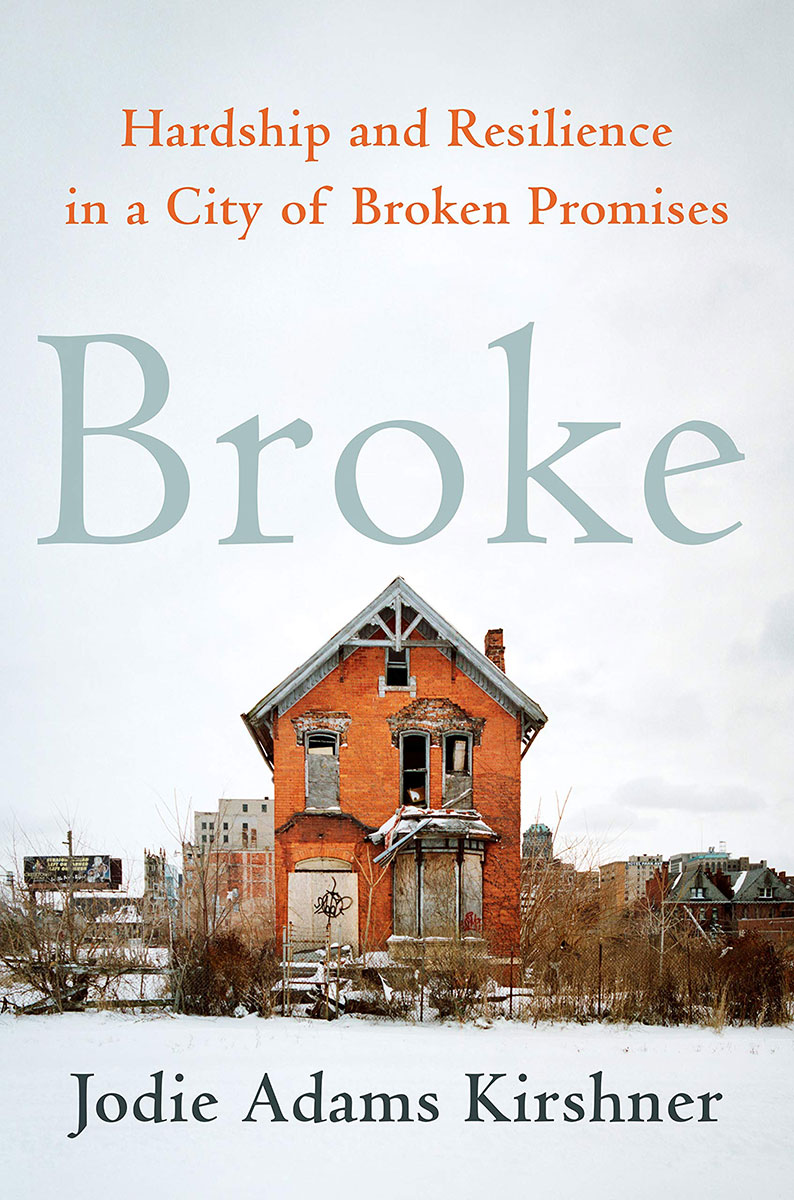Broke:
Hardship and Resilience in a City of Broken Promises
Bankruptcy and the austerity it represents have become a common “solution” for struggling American cities. What do the spending cuts and limited resources do to the lives of city residents? In Broke, Jodie Adams Kirshner follows seven Detroiters as they navigate life during and after their city’s bankruptcy. Reggie loses his savings trying to make a habitable home for his family. Cindy fights drug use, prostitution, and dumping on her block. Lola commutes two hours a day to her suburban job. Even before the bankruptcy in 2013, they struggled with the larger ramifications of poor urban policies and negligence on the state and federal level —the root causes of a city’s fiscal demise.
Like Matthew Desmond’s Evicted, Broke looks at what municipal distress means, not just on paper but in practical—and personal—terms. More than 40 percent of Detroit’s 700,000 residents fall below the poverty line. Post-bankruptcy, they struggle with a broken real estate market, school system, and job market—and their lives have not improved.
Detroit is emblematic. Kirshner makes a powerful argument that cities—the economic engine of America—are never quite given the aid that they need by either the state or federal government for their residents to survive, not to mention flourish. Success for all America’s citizens depends on equity of opportunity.
Where to Buy
Broke is available in hardcover or eBook from major retailers and independent bookstores.
Praise for Broke
“[An] eye-opening and sometimes heartbreaking narrative….
A significant work of social sciences and urban studies.”
—Kirkus Reviews, Starred Review
“The central, trenchant, undeniable argument of Broke is clear: bankruptcy is neither a fiscally responsible nor morally irresistible response to the myriad challenges faced by the modern American city… after reading the poignant, heartbreaking, defiant pages of Broke, no one should question the need for a moral referendum on how policy is created in and for urban America.” —Michael Eric Dyson
“At turns, heartbreaking, enraging and inspiring,
Broke gives us close-up, vivid, portraits of real people.”
—Andrew Cockburn, Harper’s Magazine
“The current narrative of Detroit is that it’s like a phoenix rising from the ashes. What Broke does is show Detroiters who aren’t benefiting from corporate tax subsidies much less fine dining downtown. The stories in Broke show fortitude but also the misfortune of people who do their best to navigate amid housing and job challenges.” —Natalie Moore, author of The South Side
“A valuable cautionary tale.”
—Publishers Weekly
“Broke provides a humane but clear-eyed account of the collapse and rebirth of Detroit that reveals what a court can and cannot accomplish via a well-managed municipal bankruptcy.” —Paul Romer, co-recipient, 2018 Nobel Memorial Prize in Economic Sciences and founding director, Marron Institute of Urban Governance, NYU
“What Broke really tells us is how systems of government, law and finance can crush even the hardiest of boot-strap pullers.”
—Brian Alexander, author of Glass House
“As a resident and business owner in Detroit, I think Broke captures the complexity and heartbreak here. Clear, accessible, and to the point, it’s so readable that I sped through it and then read it again to take notes.” —Susan Murphy, Pages Bookshop, Detroit





